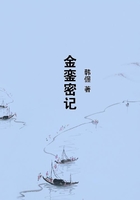Some of the bridges had sunk below the level, and the approaches had to be corduroyed to a practicable grade.Others again were humped up like tom-cats, and had to be pulled apart entirely.In spots the "corduroy" had spread, so that the horses thrust their hoofs far down into leg-breaking holes.The experienced animals were never caught, however.As soon as they felt the ground giving way beneath one foot, they threw their weight on the other.
Still, that sort of thing was to be expected.A gang of men who followed the plow carried axes and cant-hooks for the purpose of repairing extemporaneously just such defects, which never would have been discovered otherwise than by the practical experience.
Radway himself accompanied the plow.Thorpe, who went along as one of the "road monkeys," saw now why such care had been required of him in smoothing the way of stubs, knots, and hummocks.
Down the creek an accident occurred on this account.The plow had encountered a drift.Three times the horses had plunged at it, and three times had been brought to a stand, not so much by the drag of the V plow as by the wallowing they themselves had to do in the drift.
"No use, break her through, boys," said Radway.So a dozen men hurled their bodies through, making an opening for the horses.
"Hi! YUP!" shouted the three teamsters, gathering up their reins.
The horses put their heads down and plunged.The whole apparatus moved with a rush, men clinging, animals digging their hoofs in, snow flying.Suddenly there came a check, then a CRACK, and then the plow shot forward so suddenly and easily that the horses all but fell on their noses.The flanging arms of the V, forced in a place too narrow, had caught between heavy stubs.One of the arms had broken square off.
There was nothing for it but to fell another hemlock and hew out another beam, which meant a day lost.Radway occupied his men with shovels in clearing the edge of the road, and started one of his sprinklers over the place already cleared.Water holes of suitable size had been blown in the creek bank by dynamite.There the machines were filled.It was a slow process.Stratton attached his horse to the chain and drove him back and forth, hauling the barrel up and down the slideway.At the bottom it was capsized and filled by means of a long pole shackled to its bottom and manipulated by old man Heath.At the top it turned over by its own weight.Thus seventy odd times.
Then Fred Green hitched his team on and the four horses drew the creaking, cumbrous vehicle spouting down the road.Water gushed in fans from the openings on either side and beneath; and in streams from two holes behind.Not for an instant as long as the flow continued dared the teamsters breathe their horses, for a pause would freeze the runners tight to the ground.A tongue at either end obviated the necessity of turning around.
While the other men hewed at the required beam for the broken Vplow, Heath, Stratton, and Green went over the cleared road-length once.To do so required three sprinklerfuls.When the road should be quite free, and both sprinklers running, they would have to keep at it until after midnight.
And then silently the wilderness stretched forth her hand and pushed these struggling atoms back to their place.
That night it turned warmer.The change was heralded by a shift of wind.Then some blue jays appeared from nowhere and began to scream at their more silent brothers, the whisky jacks.
"She's goin' to rain," said old Jackson."The air is kind o' holler.""Hollow?" said Thorpe, laughing."How is that?""I don' no," confessed Hines, "but she is.She jest feels that way."In the morning the icicles dripped from the roof, and although the snow did not appreciably melt, it shrank into itself and became pock-marked on the surface.
Radway was down looking at the road.
"She's holdin' her own," said he, "but there ain't any use putting more water on her.She ain't freezing a mite.We'll plow her out."So they finished the job, and plowed her out, leaving exposed the wet, marshy surface of the creek-bottom, on which at night a thin crust formed.Across the marsh the old tramped road held up the horses, and the plow swept clear a little wider swath.
"She'll freeze a little to-night," said Radway hopefully."You sprinkler boys get at her and wet her down."Until two o'clock in the morning the four teams and the six men creaked back and forth spilling hardly-gathered water--weird, unearthly, in the flickering light of their torches.Then they crept in and ate sleepily the food that a sleepy cookee set out for them.
By morning the mere surface of this sprinkled water had frozen, the remainder beneath had drained away, and so Radway found in his road considerable patches of shell ice, useless, crumbling.He looked in despair at the sky.Dimly through the gray he caught the tint of blue.
The sun came out.Nut-hatches and wood-peckers ran gayly up the warming trunks of the trees.Blue jays fluffed and perked and screamed in the hard-wood tops.A covey of grouse ventured from the swamp and strutted vainly, a pause of contemplation between each step.Radway, walking out on the tramped road of the marsh, cracked the artificial skin and thrust his foot through into icy water.
That night the sprinklers stayed in.
The devil seemed in it.If the thaw would only cease before the ice bottom so laboriously constructed was destroyed! Radway vibrated between the office and the road.Men were lying idle; teams were doing the same.Nothing went on but the days of the year; and four of them had already ticked off the calendar.The deep snow of the unusually cold autumn had now disappeared from the tops of the stumps.Down in the swamp the covey of partridges were beginning to hope that in a few days more they might discover a bare spot in the burnings.It even stopped freezing during the night.At times Dyer's little thermometer marked as high as forty degrees.















